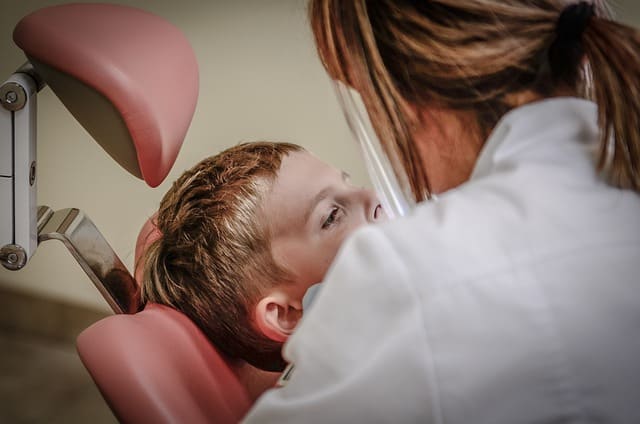Baby bottom lip quivering is a common occurrence in infants, and it can be a cause of concern for parents. The quivering or trembling of the lower lip can be due to a variety of reasons, ranging from normal developmental milestones to underlying medical conditions.
Understanding the causes and symptoms of lip quivering in babies can help parents identify when to seek medical attention.
Common causes of baby bottom lip quivering include hunger, fatigue, and overstimulation. These are normal developmental milestones that babies go through, and the quivering usually resolves on its own.
However, lip quivering can also be a sign of underlying medical conditions, such as neurological disorders or seizures. It is important for parents to be aware of the symptoms and indications that require medical attention.
Key Takeaways
- Baby bottom lip quivering can be a normal developmental milestone or a sign of underlying medical conditions.
- Parents should be aware of the symptoms and indications that require medical attention.
- Treatment and management of lip quivering depend on the underlying cause and should be discussed with a doctor.
Understanding Baby Bottom Lip Quivering
Baby bottom lip quivering is a common phenomenon that parents may observe in their newborns. It is characterized by the trembling or shaking of the baby’s bottom lip, which can be quite concerning for new parents.
However, in most cases, it is a normal part of a baby’s development.
The causes of baby bottom lip quivering are varied and can include hunger, fatigue, excitement, or even cold temperatures.
In some cases, it may be a sign of an underlying medical condition, such as a neurological disorder or a seizure disorder. However, this is relatively rare.
Newborns are still developing their motor skills and are learning to control their facial muscles. As a result, it is not uncommon for babies to experience lip quivering or other involuntary movements.
In most cases, these movements are harmless and will resolve on their own as the baby grows and develops.
If a baby’s lip quivering is accompanied by other symptoms, such as fever, lethargy, or difficulty breathing, it is important to seek medical attention immediately. These symptoms may be indicative of a more serious condition that requires prompt treatment.
In general, parents should not be overly concerned if they observe their baby’s bottom lip quivering. It is a normal part of development and will typically resolve on its own over time.
However, if there are any concerns or questions, it is always best to consult with a pediatrician or other healthcare provider.
Common Causes of Lip Quivering in Babies
Lip quivering is a common occurrence in babies, and it can be caused by a variety of factors. Understanding the underlying causes of lip quivering can help parents and caregivers respond appropriately to their baby’s needs.
Here are some of the most common causes of lip quivering in babies:
Nervous System Immaturity
Babies are born with an underdeveloped nervous system, which means that they may experience involuntary movements and reflexes.
Lip quivering is one such reflex, and it is often caused by an immature nervous system. As the baby grows and develops, their nervous system will become more mature, and the lip quivering reflex will gradually disappear.
Crying
Crying is a natural response to a variety of stimuli, including hunger, discomfort, and emotional distress. When a baby cries, their lip muscles may quiver as a result of the intense emotion and physical exertion.
Temperature
Babies are very sensitive to changes in temperature, and exposure to cold air or water can cause their lip muscles to quiver. Similarly, overheating can also cause lip quivering in babies.
Hunger
When a baby is hungry, their lip muscles may quiver as they anticipate feeding. This is a natural response to hunger, and it usually subsides once the baby has been fed.
Tiredness
Just like adults, babies can become tired and fatigued. When a baby is tired, their lip muscles may quiver as a result of exhaustion.
Emotions
Babies experience a wide range of emotions, including happiness, excitement, and fear. When a baby is experiencing intense emotions, their lip muscles may quiver as a result.
Gas
Gas is a common problem in babies, and it can cause discomfort and pain. When a baby has gas, their lip muscles may quiver as a result of the discomfort.
Muscle Fatigue
Babies are constantly growing and developing, and this can be physically exhausting. When a baby’s muscles become fatigued, their lip muscles may quiver as a result.
Overall, lip quivering in babies is a natural and common occurrence that is usually nothing to worry about. However, if parents or caregivers are concerned about their baby’s lip quivering, they should consult with a healthcare professional to rule out any underlying medical conditions.
Medical Conditions Related to Lip Quivering
There are various medical conditions that can cause lip quivering in babies. Some of these conditions include:
- Blood sugar imbalances: Hypoglycemia, or low blood sugar, can cause lip quivering in babies. This can occur if a baby is not getting enough breast milk or formula, or if they have a medical condition that affects their blood sugar levels.
- Calcium imbalances: Hypocalcemia, or low calcium levels, can cause muscle spasms and tremors, including lip quivering. Calcium deficiency can also lead to hypocalcemia, which is more common in premature babies.
- Birth defects and congenital disabilities: Certain birth defects and congenital disabilities can cause lip quivering in babies. For example, babies born with a cleft lip or palate may experience lip quivering due to muscle weakness or nerve damage.
- Neurological conditions: Certain neurological conditions can cause lip quivering in babies. For example, perinatal encephalopathy, which is a brain injury that occurs around the time of birth, can cause tremors and other symptoms.
- Hyperthyroid state: Hyperthyroidism, or an overactive thyroid gland, can cause lip quivering as well as other symptoms such as jitteriness, irritability, and difficulty sleeping.
- Birth-related defects: Certain birth-related defects such as intracranial hemorrhage can cause lip quivering in babies. This is a serious condition that requires immediate medical attention.
It is important to note that lip quivering in babies can also be a normal developmental milestone, especially in the first few months of life.
However, if you notice persistent or severe lip quivering in your baby, it is important to consult with a healthcare provider to rule out any underlying medical conditions.
Also see: How To Teach Baby To Chew
Symptoms and Indications to Consult a Doctor
If your baby’s bottom lip is quivering, it may be a sign of various underlying issues. While it is common for babies to experience trembling or quivering of their lips, it is important to be aware of the symptoms that may require medical attention.
If your baby’s quivering lip is constant or accompanied by fussiness and poor feeding, it may be an indication that they need medical attention.
Additional symptoms such as fever or illness may also be present. In such cases, it is important to consult a doctor or pediatrician as soon as possible.
It is important to note that some babies may experience quivering lips without any underlying medical issues. However, if your baby’s quivering lip is persistent or occurs frequently, it is best to seek medical advice.
Some symptoms that may require medical attention include:
- Constant quivering of the bottom lip.
- Fussiness and poor feeding.
- Additional symptoms such as fever or illness.
If you notice any of these symptoms, it is important to consult a doctor or pediatrician. They can help determine the underlying cause of your baby’s quivering lip and provide appropriate treatment.
Diagnostic Procedures
When a baby’s bottom lip quivers, it may be a sign of an underlying medical condition. To diagnose the cause of the quivering, doctors may perform a variety of diagnostic procedures.
One common procedure is an electroencephalogram (EEG), which measures the electrical activity in the brain. This test can help diagnose neurological conditions that may be causing the quivering.
Magnetic resonance imaging (MRI) and computed tomography (CT) scans may also be used to image the brain and identify any abnormalities that may be causing the lip quivering.
In some cases, an X-ray may be ordered to check for any bone abnormalities in the face or jaw that may be causing the quivering.
Blood tests to examine electrolyte levels and cerebrospinal fluid tests to check for infections or other abnormalities may also be ordered.
Neural sonography, which uses ultrasound to image the brain, may be used in infants to diagnose conditions that may be causing the lip quivering.
Overall, the diagnostic procedures used to diagnose the cause of baby bottom lip quivering will depend on the individual case and the suspected underlying condition. It is important to consult a healthcare professional if you have concerns about your baby’s health.
Treatment and Management of Lip Quivering
When a baby’s bottom lip quivers, it can be a concerning sight for parents. However, in most cases, it is not a cause for alarm and resolves on its own without any treatment.
In some cases, it may be due to an underlying medical condition, and treatment may be necessary.
Identifying the Cause
The first step in treating and managing lip quivering is to identify the cause. In many cases, it is due to a simple issue such as hunger, cold, or fatigue.
Ensuring that the baby is well-fed, warm, and well-rested can help alleviate the symptoms.
If the lip quivering is due to teething, providing the baby with teething toys or medication can help provide relief. If it is due to an underdeveloped nervous system, physical therapy may be recommended to help strengthen the muscles and nerves in the mouth.
If the cause of the lip quivering is more serious, such as a neurological condition, it is essential to seek the advice of a medical professional. They may refer the baby to a neurological expert who can provide a diagnosis and recommend appropriate treatment options.
Treatment Options
In most cases, lip quivering does not require any specific treatment. However, if it is causing discomfort or interfering with the baby’s feeding or speech development, treatment may be necessary.
Some treatment options may include:
- Medication to treat underlying medical conditions
- Physical therapy to strengthen the muscles and nerves in the mouth
- Surgery to correct any physical abnormalities
It is important to note that treatment options for baby lip trembling should only be pursued under the guidance of a medical professional.
Management
In addition to treatment, there are things parents can do to help manage lip quivering in their baby. These include:
- Ensuring the baby is well-fed, warm, and well-rested
- Providing teething toys or medication if the lip quivering is due to teething
- Seeking medical advice if the lip quivering is persistent or interfering with the baby’s feeding or speech development
By identifying the cause and seeking appropriate treatment and management, parents can help alleviate their baby’s lip quivering and ensure their overall health and well-being.
Prevention and Care Tips
Preventing baby lip quivering can be challenging as it can be caused by a range of factors, including birth complications, neurological disorders, or even normal developmental processes.
However, there are some things parents can do to minimize the frequency and severity of lip quivering in their babies.
One of the most effective ways to prevent lip quivering is to ensure that the baby is well-fed and well-rested.
Hunger and fatigue can exacerbate lip quivering, so parents should aim to feed their babies on a regular schedule and ensure that they get enough sleep.
Another important factor to consider is the baby’s environment. Loud noises, bright lights, and other sensory stimuli can trigger lip quivering in some babies.
Parents should try to create a calm and quiet environment for their baby, especially during feeding and sleeping times.
In some cases, lip quivering may be accompanied by other symptoms such as jerking movements or teeth chattering. If this is the case, it is important to seek medical attention to rule out any underlying neurological conditions.
When it comes to caring for a baby with lip quivering, there are a few things parents can do to help soothe their baby. Gentle rocking, swaddling, and skin-to-skin contact can all help to calm a fussy baby and reduce the frequency of lip quivering.
In summary, while it may not be possible to completely prevent baby lip quivering, parents can take steps to minimize its occurrence and provide comfort to their baby when it does occur.
By creating a calm and nurturing environment and seeking medical attention when necessary, parents can help their baby thrive and grow.
Related Posts:
- When Do Babies Eyebrows Come In?
- When Do Babies Burp Themselves?
- How To Get An Overtired Toddler To Sleep?
Frequently Asked Questions
What causes a baby’s lip to quiver during feeding?
A baby’s lip may quiver during feeding due to several reasons. It could be due to the baby’s immature nervous system, which causes the lip muscles to tremble. It could also be a sign of hunger or fatigue, or the baby may be experiencing discomfort or pain.
Is it normal for a baby’s lip to quiver?
Yes, it is normal for a baby’s lip to quiver during feeding. It is a common reflex that occurs in infants, especially those under six months old. It usually disappears as the baby’s nervous system matures.
How can I soothe my baby’s quivering lip?
To soothe your baby’s quivering lip, you can try feeding them in a calm and quiet environment, making sure they are well-rested and not hungry. You can also try using a pacifier or gently massaging their lips to help relax the muscles.
Does a quivering lip indicate a medical issue?
In most cases, a quivering lip is not a sign of a medical issue. However, if the quivering is accompanied by other symptoms such as difficulty breathing, lethargy, or fever, it may indicate an underlying medical condition. In such cases, it is best to seek medical attention.
At what age do babies outgrow lip quivering?
Babies usually outgrow lip quivering by the age of six months as their nervous system matures. However, some babies may continue to experience it until they are a year old.
Can lip quivering affect a baby’s ability to breastfeed?
Lip quivering does not usually affect a baby’s ability to breastfeed. However, if the quivering is accompanied by difficulty latching or sucking, it may make feeding more challenging.
In such cases, it is best to consult a lactation consultant or a healthcare provider for guidance.

Iesha is a loving mother of 2 beautiful children. She’s an active parent who enjoys indoor and outdoor adventures with her family. Her mission is to share practical and realistic parenting advice to help the parenting community becoming stronger.



